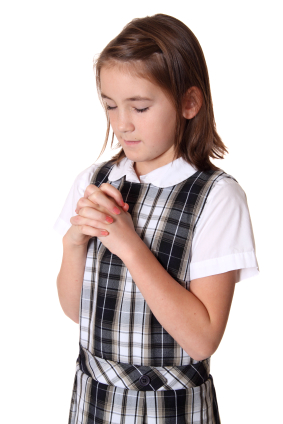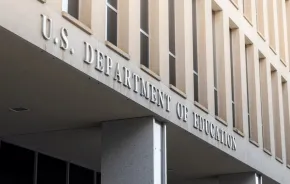 The day I graduated from my private Catholic high school, I recall vowing that I would thereafter immerse myself in more diverse learning environments. When the time came to consider early-learning options for my own children, I had no intention of sending them to a faith-based school. It was my husband who suggested enrolling our eldest daughter in our church’s preschool nine years ago, saying, “Try it. I bet you will find your people there.”
The day I graduated from my private Catholic high school, I recall vowing that I would thereafter immerse myself in more diverse learning environments. When the time came to consider early-learning options for my own children, I had no intention of sending them to a faith-based school. It was my husband who suggested enrolling our eldest daughter in our church’s preschool nine years ago, saying, “Try it. I bet you will find your people there.”
Turned out, he was right. For the first time since becoming a parent, I finally felt part of a larger community — at our daughter’s school. I had been searching for somewhere to belong as a mother. I tried it all, from pre-natal yoga, PEPS and La Leche League to co-op and community center preschools. Although I made a few good friends along the way, no group was a perfect fit.
So it was something of a revelation to me to discover such a strong sense of belonging for my family within a Catholic school community. Was it because I share a cultural Catholic heritage? Maybe, but many families that choose faith-based schooling for their children don’t practice the same religion, and some practice no religion at all.
Why parents choose faith-based schools
Considering common reasons why other families choose to enroll their children in religious elementary, middle and high schools can be a helpful exercise for parents who are apprehensive about faith-based education options. Anoo Padte, founder of Art of Education, a consultative practice that supports parents in articulating a vision for their child’s education and fulfilling it by finding the right school, says families evaluate faith-based schools for many different reasons:
- Some seek a spiritual grounding alongside the academic for their children.
- Others want academics to be informed by the religious or spiritual beliefs of a school.
- Parents who want a more affordable private education for their child weigh cost factors — tuition at faith-based schools can be 25‒50 percent less than at other comparable independent schools.
- Still others seek a community of families that share their faith, coming together for celebrations, rituals and ceremonies.
Every faith-based school — whether it follows the doctrines of Catholicism, Christianity, Judaism or Islam — is unique, Padte says. “That said, most faith-based schools are structured and organized and follow a strong set of rules around behavior, curriculum delivery and student-teacher relationships. Students who need or respond well to a structured, rule-based learning environment, where what is expected and required is clearly laid out, tend to thrive in faith-based schools.”
The appeal of a more-structured learning environment is what motivated Gretchen Kudia to enroll her son at St. John Catholic School in north Seattle. “My son wants discipline and rules. He is that kid who wants everything to be fair. This was the right school for him,” she says, even though she and her husband are not practicing Catholics.
Supporting cultural identity, faith formation
Devorah Signer Hill wasn’t motivated to look at faith-based school options until she resolved that her oldest son would benefit from a smaller class size. Her non-religious husband suggested the Seattle Jewish Community School in northeast Seattle. She considers herself more culturally Jewish and doesn’t practice at an area synagogue. “What drew us was the fact that SJCS offers a top-notch private school education,” Signer Hill says.
Of course, all faith-based schools teach from a religious point of view, and parents sign on for this upon enrollment. Although Signer Hill was hesitant initially about this aspect of attendance and instruction, her children’s blossoming religious identity connects her to what she learned as a kid. “When you are a minority religion — even if you are a really secular person — knowing as much as you can about how that identity suits you gives you the foundation to go out into the world and be proud of this identity.”
Broadening a worldview
Even parents who don’t experience affinity with any religious group often want their children to obtain an education steeped in spiritual lessons. Although Briget and Mike Spear are not currently part of a faith community, the religious framework of their sons’ education at St. John and Bishop Blanchet High School enriches their family discussions.
The Spears want their sons to learn about religion, grow spiritually and question faith from that vantage point. “It gives you an avenue to talk to your kids about a very complex thing that often they won’t be really questioning until they are older,” Briget says. “Especially in somewhat-agnostic Seattle, this was an avenue to explore these issues. We have to learn about different religions in order to understand the politics of the world.”
This idea that religion provides a lens through which to examine the broader world is yet another reason parents choose religious education. “When there is a religious connection, there is an existing framework for discussions and grounding in a common set of values that helps this exploration,” Mike Downs, interim head of the Jewish Day School in Bellevue, says.
Instilling ethics and morals, forging community connection
Not all faith-based schools are part of a minority religion, but within this grouping, the student body often relishes the opportunity to engage with people who share same or similar values. “At any minority religious school there is a sense of finding a like kind. It’s not just about religion. It is cultural and it is ethnic,” Downs says.
Often, Downs says, families at Jewish schools are not members of a synagogue, and the school becomes their Jewish meeting place. “Parents come to our Friday celebration — it may be the only time they celebrate Shabbat, and it’s very meaningful to them.”
Even at schools that fall within the majority Christian religions, families that don’t practice religion formally otherwise find the community within the school can support and anchor their spiritual needs. “I appreciate that religion encourages empathy in a community,” Kudia says. “When my son’s cat died, they all said a prayer at school. Religion gives them all the same language. As a group they can gather and send out a good thought and have a consolidated focus for empathy and caring and forgiveness. I like that [my son] is singing ‘Do unto others as you would have them do unto you.’”
Kudia is also giving voice to the idea that schools with faith-based curriculum and philosophy can help mind the gap in an era when character education is so important. “Morals, ethics and character development inform some of the fundamental beliefs and values of a faith-based school,” Padte says. “This is not to say that there are not other independent schools and public schools that are also strongly focused on character development. Still, it is almost guaranteed that a faith-based school will have beliefs related to character development.”
Like any choice we make for our children, deciding whether a faith-based school is the best option requires consideration of many factors. In the end, parents must do what they feel is right for their family, based upon hopes for and expectations of the individual child and his or her school environment. As a parent who chose a faith-based education path for my children nine years ago, I continually test my faith in the decision. But every time I do so, I am reassured by my affirmative answer to what for me, at least, is the fundamental question: Are my children thriving at their school?
Writer, editor and writing coach Nancy Schatz Alton is finishing the last draft of her memoir about the beginning of her dyslexic daughter’s learning journey. She lives in Ballard with her husband and two daughters and blogs at Within the Words.











